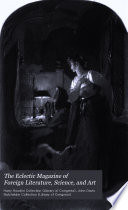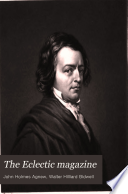 | William Hazlitt - 1836 - 372 pages
...thing lies still, unless somewhat else stir it, it will lie still for ever, is a truth that no man doubts of. But that when a thing is in motion, it...desire of rest they find in themselves consisteth. From hence it is, that the Schools say, heavy bodies fall downward out of au appetite to rest, and... | |
 | William Hazlitt - 1836 - 526 pages
...thing lies still, unless somewhat else stir it, it will lie still for ever, is a truth that no man doubts of. But that when a thing is in motion, it...desire of rest they find in themselves consisteth. From hence it is, that the Schools say, heavy bodies fall downward out of an appetite to rest, and... | |
 | William Hazlitt - 1836 - 538 pages
...thing lies still, unless somewhat else stir it, it will lie still for ever, is a truth that no man doubts of. But that when a thing is in motion, it...desire of rest they find in themselves consisteth. From hence it is, that the Schools say, heavy bodies fall downward out of an appetite to rest, and... | |
 | Thomas Hobbes - 1839 - 766 pages
...eternally be in motion, unless somewhat else stay it, though the reason be the same, namely, imagination, that nothing can change itself, is not so easily assented...desire of rest they find in themselves, consisteth. From hence it is, that the schools say, heavy bodies fall downwards, out of an appetite to rest, and... | |
 | Thomas Hobbes - 1839 - 766 pages
...eternally be in motion, unless somewhat else stay it, though the reason be the same, namely, imagination, that nothing can change itself, is not so easily assented...desire of rest they find in themselves, consisteth. From hence it is, that the schools say, heavy bodies fall downwards, out of an appetite to rest, and... | |
 | Thomas Hobbes - 1840 - 492 pages
...this obscure conception is that we call phantasy, or imagination : imagination being, to define it, conception remaining, and by little and little decaying from and after the act of sense. 2. But when present sense is not, as in sleep, M«T »'"' ... . . ., . . dnuuns d'.linnl. there the... | |
 | 1842 - 756 pages
...signification, yet, following the steps of Aristotle, he defines Phantasy, or Imagination, to be — " Conception remaining, and by little and little decaying from and after the act of sense."t The words are now traced from their native homes, and implanted as synonyms in our own language... | |
 | 1848 - 614 pages
...according to this theory, nothing but fancy, the image and apparition in the brain, — " imagination being conception remaining, and by little and little decaying from and after the act of sense ;" and we have nothing more. What becomes then of the certainty of knowledge i What right have we to... | |
 | John Holmes Agnew, Walter Hilliard Bidwell - 1848 - 610 pages
...according to this theory, nothing but fancy, the image and apparition in the brain, — " imagination being conception remaining, and by little and little decaying from and after the act of sense ;" and we have nothing more. What becomes then of the certainty of knowledge i What right have we to... | |
 | 1854 - 492 pages
...themselves ; and because they find themselves subject, after motion, to pain and lassitude, think everything else grows weary of motion and seeks repose of its...wherein that desire of rest they find in themselves consists.3 When a body is once in motion it moves, unless something else hinders it, eternally ; and... | |
| |